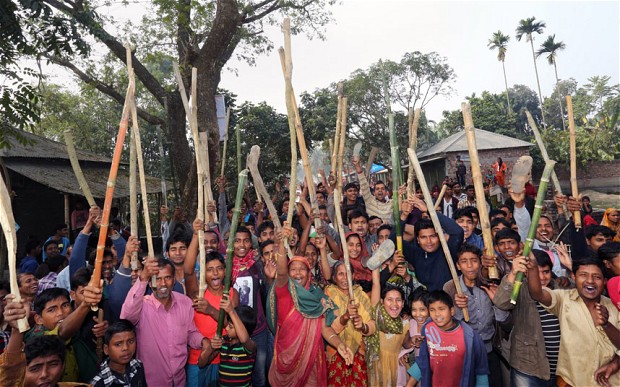British government has said it is reviewing its funding of aid programmes in support of Bangladesh’s parliament following an electiom marred by deadly violence and accusations of ballot fixing
A spokesman at the High Commission in Dhaka said two programmes – costing more than £55 million – could lose part of its future funding in light of the current “political situation”.
They expressed concern that voters in 153 out of the total 300 seats had no chance to vote as only a single candidate was standing, and in the remaining 147 where there was a vote, candidates for the most part only provided token competition.
The main opposition parties boycotted the elections, which were held last Sunday, as the government had refused to hand over power before the election to a neutral caretaker government, accusing the Awami League of seeking to fix the results.
In a statement issued soon after the election, Baroness Warsi, the senior foreign office minister expressed her disappointment, “that voters in more than half the constituencies did not have the opportunity to express their will at the ballot box and that turnout in most other constituencies was low.”
Warren Daley, a spokesperson based at the High Commission in Dhaka said this week that UK Aid was reviewing two programmes involving work with the Bangladesh parliament to ‘“take into account the emerging political situation and [to decide] which aspects of the projects it will be appropriate to take forward”.
Bangladesh, the fourth largest recipient of British government aid, was given £274.9 million in 2013/14, with £265 million planned for 2014/15.
Although most of this money is given to international agencies and non-government organisations, 30 percent goes directly or indirectly to the Bangladesh government to support its health, education and climate change programs.
UK Aid has budgeted to spend £56.3 million over a five-year period on the two parliamentary support projects that are now under review, with over £12 million remaining to be spent this and next year. Not all of the project’s money is spent on parliamentary activities.
The main project, Promoting Democratic Institutions and Practices, is implemented by the Asia Foundation and one of its two principle objectives is to work “within parliament to improve the effectiveness and transparency of parliament.’ It has been working with members of parliament to provide them better information and capacity for fulfilling their ‘legislative, representational and oversight responsibilities.”
The other project, in which the World Bank is managing but the government is in control, is concerned, in part, with improving parliamentary oversight of financial budgets and government audits.
Iftekhar Zaman, the executive director of Transparency International in Bangladesh, which is funded in part by UK aid, said that he was “not surprised that the British government would be reviewing these projects, because the parliament that is being formed, though constitutionally and legally correct, does not have the political, moral and public mandate, and the credibility of the parliament will remain questionable.”
Source: Telegraph










